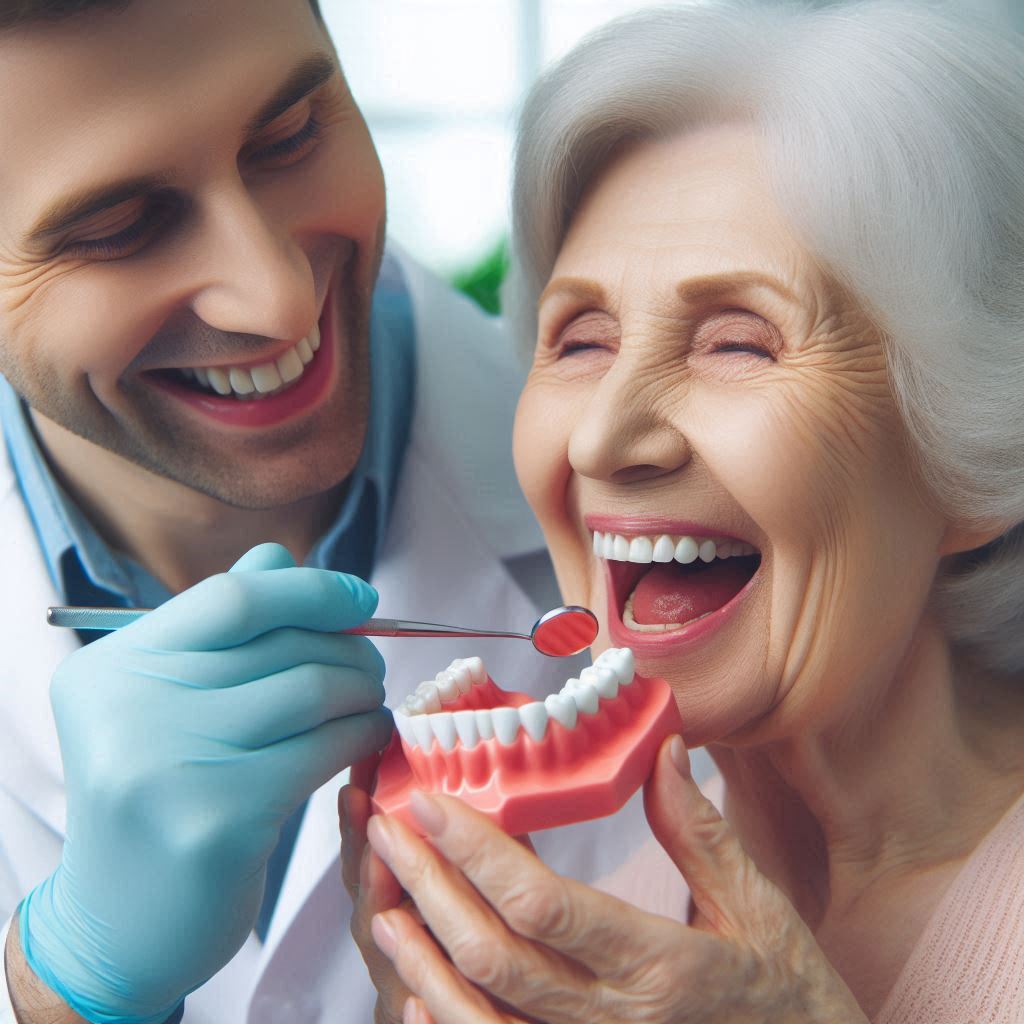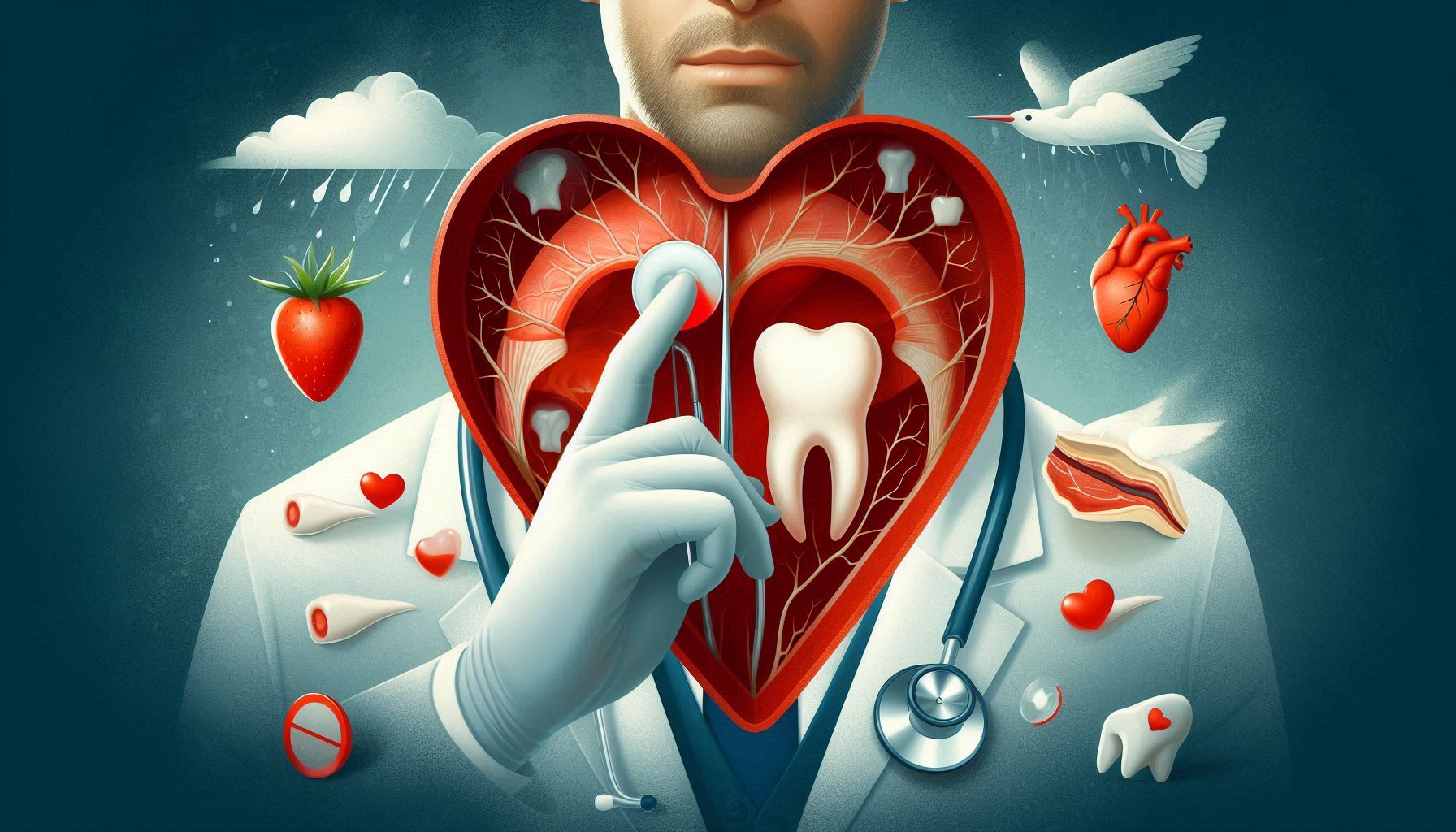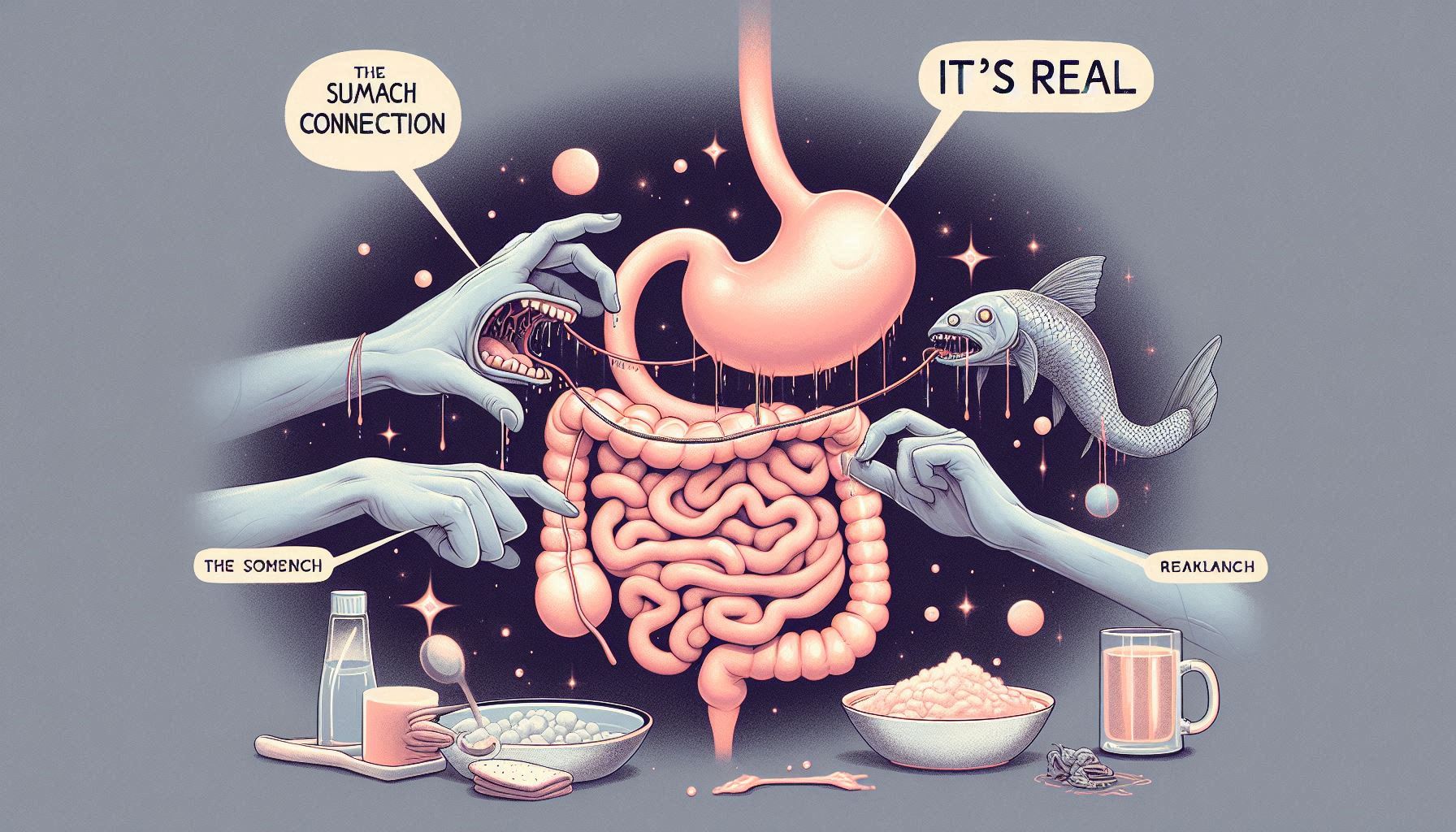Introduction
Oral health is often overlooked in older adults, but it plays a vital role in maintaining overall health. For seniors, good oral hygiene helps prevent serious issues such as infections, tooth loss, and difficulties with eating and speaking. Moreover, poor oral health has been linked to various systemic conditions such as heart disease, diabetes, and even cognitive decline.
For seniors, maintaining oral health isn’t just about brushing and flossing. It’s also about managing specific age-related challenges and staying informed about the various oral care options available.
The Link Between Oral Health and Overall Health
Many studies have shown that oral health is linked to systemic health. For seniors, chronic conditions such as heart disease, diabetes, and respiratory issues may be exacerbated by poor oral hygiene. The bacteria in the mouth can travel through the bloodstream, potentially leading to inflammation and infections elsewhere in the body. Therefore, maintaining a healthy mouth is an essential aspect of aging well.
Common Oral Health Issues for Seniors
Dry Mouth (Xerostomia)
Dry mouth, or xerostomia, is one of the most common oral health problems among seniors. As we age, the production of saliva decreases, leading to a dry mouth. This condition can make it difficult to speak, chew, swallow, and taste food. A dry mouth can also increase the risk of cavities, gum disease, and bad breath.
- Causes:
- Medication side effects (especially antidepressants, antihistamines, and blood pressure medications)
- Dehydration
- Aging
- Certain medical conditions (such as diabetes, Sjogren’s syndrome)
- Solutions:
- Drink plenty of water throughout the day
- Use saliva substitutes or mouth moisturizers
- Chew sugar-free gum or suck on sugar-free candies to stimulate saliva production
- Avoid alcohol, tobacco, and caffeine, which can dry out the mouth
Gum Disease (Gingivitis and Periodontitis)
Gum disease is an infection of the tissues that support your teeth. It starts as gingivitis (inflammation of the gums) and can progress to periodontitis, which can lead to tooth loss if untreated.
- Causes:
- Poor oral hygiene
- Smoking or tobacco use
- Diabetes
- Poor nutrition
- Solutions:
- Brush teeth at least twice a day with fluoride toothpaste
- Floss daily to remove plaque between teeth
- Visit the dentist regularly for professional cleanings
- Manage underlying health conditions like diabetes
Tooth Decay and Cavities
Tooth decay, or cavities, is caused by plaque buildup that produces acids that erode the enamel on your teeth. While cavities are often associated with children, seniors are also at risk.
- Causes:
- Reduced saliva production
- Poor diet (high in sugar and starch)
- Poor oral hygiene
- Receding gums exposing tooth roots
- Solutions:
- Brush with fluoride toothpaste
- Use fluoride mouthwash or toothpaste to remineralize enamel
- Avoid sugary snacks and drinks
- Regular dental visits to catch cavities early
Tooth Loss
Tooth loss is common among seniors and can result from untreated cavities, gum disease, or injury. Missing teeth can impact speech, chewing, and self-esteem.
- Solutions:
- Dentures or partial dentures to replace missing teeth
- Dental implants as a permanent solution
- Good oral hygiene to prevent further tooth loss
Oral Cancer
Oral cancer is more common in older adults and is often linked to tobacco and alcohol use. It can occur in the mouth, tongue, gums, and throat. Early detection is key to successful treatment.
- Signs to watch for:
- Sores that do not heal
- Persistent pain or swelling in the mouth
- Difficulty swallowing or chewing
- Solutions:
- Regular dental checkups for early detection
- Quitting smoking and reducing alcohol consumption
- Seeking immediate attention if unusual symptoms arise
Denture-Related Issues
Dentures are a common solution for seniors who have lost most or all of their natural teeth. However, they can present challenges such as discomfort, difficulty eating, and the need for adjustments over time.
- Solutions:
- Regular visits to the dentist for proper fitting
- Cleaning dentures daily to prevent buildup
- Using denture adhesives to improve stability
- Avoiding foods that can damage dentures
Sensitivity and Pain
Many seniors experience tooth sensitivity or pain, often due to gum recession or tooth wear. Sensitivity can make eating and drinking uncomfortable, especially with hot or cold foods.
- Solutions:
- Use toothpaste designed for sensitive teeth
- Avoid extreme temperatures in food and beverages
- Visit the dentist for possible solutions like fluoride treatments or bonding to cover exposed tooth roots
Thrush (Oral Candidiasis)
Thrush is a fungal infection that results in white patches in the mouth, tongue, or throat. It’s common among those with weakened immune systems, including seniors, and is often associated with dentures.
- Solutions:
- Antifungal medications prescribed by a doctor or dentist
- Keeping dentures clean and removing them at night
- Rinsing the mouth with salt water to reduce discomfort
Medication Side Effects on Oral Health
Many medications prescribed to seniors can affect oral health by causing dry mouth, increasing the risk of cavities, or altering taste perception. Some medications can even cause gum swelling or inflammation.
- Solutions:
- Discuss medication side effects with a healthcare provider
- Use saliva substitutes to combat dry mouth
- Maintain diligent oral hygiene practices to minimize oral health risks
Prevention Strategies
- Daily Oral Hygiene Practices: Good oral hygiene is essential for preventing most oral health issues. Brushing at least twice a day and flossing daily helps remove plaque and bacteria from teeth and gums.
- Choosing the Right Toothbrush and Toothpaste: For seniors, choosing a toothbrush with a soft bristle is important to avoid damaging gums or enamel. Fluoride toothpaste is crucial for preventing cavities and strengthening enamel.
- Flossing and Interdental Brushes: Flossing is essential to remove plaque and food particles from between teeth. If traditional flossing is challenging, interdental brushes can be a helpful alternative.
- Staying Hydrated: Drinking plenty of water helps keep the mouth moist, reduce the risk of cavities, and prevent dry mouth.
- Proper Nutrition for Healthy Teeth and Gums: A balanced diet rich in vitamins and minerals is important for oral health. Calcium, vitamin D, and phosphorus are particularly beneficial for maintaining strong teeth and bones.
Solutions to Common Oral Health Issues
Each oral health issue mentioned earlier has specific solutions, from treatments for dry mouth to gum disease management, tooth decay, and dentures. In the following sections, solutions are expanded upon, offering practical advice for seniors to implement.
Special Considerations for Seniors with Chronic Conditions
Chronic conditions, which are common among seniors, can have a profound impact on oral health. Managing these health concerns is essential for maintaining healthy teeth and gums. Understanding the relationship between chronic conditions and oral health can help seniors make informed choices and take preventive measures.
Diabetes and Oral Health
Diabetes is a prevalent condition in older adults, and it can significantly affect oral health. High blood sugar levels can increase the risk of gum disease and infections, and it can also cause dry mouth, which in turn makes it more difficult to fight off cavities and other oral infections.
- Solutions:
- Regular dental checkups to monitor oral health
- Consistent management of blood glucose levels
- Daily brushing and flossing to reduce the buildup of plaque
- Hydrating frequently to prevent dry mouth
- Using fluoride toothpaste to help protect against tooth decay
Heart Disease and Oral Health
Oral health and heart health are interconnected. Studies have found that gum disease is linked to an increased risk of heart disease. The bacteria from infected gums can enter the bloodstream and contribute to inflammation in blood vessels, which can increase the risk of heart disease.
- Solutions:
- Maintaining excellent oral hygiene to reduce the risk of gum disease
- Regular dental cleanings to prevent plaque buildup
- Managing cardiovascular health through diet, exercise, and prescribed medication
- Not smoking or using tobacco, as these can both impact oral and heart health
Arthritis and Its Impact on Dental Care
Arthritis can present unique challenges for seniors when it comes to maintaining good oral hygiene. Pain and stiffness in the hands and wrists may make it difficult to properly hold and use a toothbrush or floss.
- Solutions:
- Using ergonomically designed toothbrushes with larger handles for a better grip
- Electric toothbrushes that require less manual effort
- Assistive devices for flossing, such as flossing tools or holders
- Seeking assistance from a caregiver or family member when needed
Dementia and Oral Care
Seniors with dementia often face challenges in maintaining personal hygiene, including oral care. Cognitive decline can make it difficult for individuals to remember to brush their teeth or visit the dentist. Additionally, they may forget to remove dentures or clean them properly, which can lead to infections and other oral health issues.
- Solutions:
- Establishing a routine for oral care, such as brushing at the same time every day
- Using simple, easy-to-follow instructions or reminders for brushing and flossing
- Caregiver involvement to assist with brushing and regular checkups
- Denture care education for caregivers to ensure proper cleaning and maintenance
When to See a Dentist
Regular dental visits are an essential part of maintaining good oral health, especially for seniors who may be at a higher risk for oral diseases. Seniors should see their dentist regularly for checkups and cleanings, even if they don’t have noticeable symptoms. Early detection of problems can help prevent more serious issues from developing.
Regular Dental Checkups
Seniors should aim to visit the dentist at least twice a year for routine cleanings and examinations. These visits allow the dentist to catch potential problems early, such as cavities, gum disease, or even oral cancer. For seniors with existing dental issues, the dentist may recommend more frequent visits.
Red Flags and Warning Signs for Immediate Attention
Certain symptoms may indicate the need for immediate dental attention. These symptoms include:
- Persistent bad breath (halitosis)
- Swelling or bleeding gums
- Difficulty chewing or swallowing
- Sores or ulcers that do not heal within a couple of weeks
- Pain when biting or chewing
- Loose or broken teeth
- Changes in the color or texture of the mouth or tongue
If any of these symptoms arise, it is crucial to seek dental care promptly to avoid complications.
Working with a Caregiver to Maintain Oral Health
Seniors who have caregivers should involve them in their oral care routine. Caregivers can help by:
- Assisting with brushing and flossing, especially for seniors with limited mobility or cognitive impairment
- Ensuring that dentures are properly cleaned and maintained
- Keeping track of dental appointments and reminding seniors to visit the dentist regularly
- Offering gentle encouragement to maintain good oral hygiene practices
The Importance of Education and Advocacy for Seniors’ Oral Health
Oral health education plays a crucial role in promoting the well-being of seniors and their caregivers. It is essential to advocate for senior oral health on both individual and societal levels. As people age, they face unique oral health challenges, such as dry mouth, tooth loss, gum disease, and difficulty maintaining proper oral hygiene due to physical or cognitive limitations. Therefore, the healthcare system must prioritize addressing these needs as part of a comprehensive approach to senior health management. Efforts should be made to raise awareness about the importance of oral care for seniors, ensuring that caregivers are educated on how to assist with oral hygiene and recognize signs of potential issues. Additionally, senior-friendly dental services should be more widely available, with practitioners trained to meet the specific needs of older adults.
Policy changes are also necessary to integrate oral health into overall health strategies for aging populations. Governments and healthcare organizations should provide access to affordable dental care, ensuring that seniors receive preventive treatments and interventions for conditions like tooth decay and periodontal disease. By giving oral health the attention it deserves, we can improve the quality of life for seniors, reduce the risk of systemic health problems, and support caregivers in their essential roles.
Conclusion
Oral care is an essential aspect of senior health, and it should never be overlooked. The issues that seniors face with their oral health may be more complex than those encountered in younger individuals, but with the right knowledge and strategies, these challenges can be managed or prevented. The importance of daily oral hygiene, regular dental checkups, and addressing age-related oral health concerns cannot be overstated. From dry mouth to gum disease, tooth loss to oral cancer, seniors can take proactive steps to prevent these conditions and manage them when they arise.
As caregivers, family members, or even seniors themselves, it’s crucial to advocate for good oral health practices and ensure that necessary steps are taken to prevent and treat oral health issues. By maintaining a consistent oral care routine, seeking professional help when needed, and managing chronic conditions effectively, seniors can preserve their oral health and, by extension, their overall well-being. The role of caregivers in promoting oral health for seniors cannot be understated. Caregivers can provide valuable support, assist with daily oral care tasks, and monitor the senior’s condition for changes that might require professional care. Education and awareness about the link between oral health and systemic health, as well as the specific challenges seniors face, can empower both seniors and caregivers to take the right actions.
In conclusion, taking steps to maintain good oral hygiene and addressing oral health issues as soon as they arise can lead to better quality of life, improved health outcomes, and a more confident and comfortable senior experience. As we continue to prioritize senior care and well-being, oral health should remain an integral part of the conversation.
SOURCES
Badran, Z., & Finkelstein, M. (2022). Oral health in aging populations: Understanding the challenges. Journal of Geriatric Dentistry, 29(4), 215-223.
Chapman, D. M., Perry, H. B., & Lundgren, M. R. (2020). The role of oral hygiene in managing systemic conditions in older adults. Clinical Oral Investigations, 24(7), 2639-2647.
Emerson, E. A., & Garcia, A. D. (2021). Xerostomia: Its prevalence and management in elderly populations. The Journal of Aging and Oral Health, 38(3), 145-152.
Gibbons, C. G., & Buckland, C. R. (2023). Management of oral health complications in seniors with chronic diseases. American Journal of Public Health and Oral Care, 64(2), 98-107.
Lynch, C. L., & Wilson, H. A. (2021). Aging and oral health: Implications for seniors. Journal of Dentistry for Older Adults, 42(5), 278-285.
Murphy, K. S., & Ramos, A. P. (2019). Oral health and its links to heart disease in elderly populations. Journal of Cardiovascular Dentistry, 57(12), 314-321.
Perez, M. L., & Taylor, R. M. (2020). Gum disease and diabetes: A two-way street. Geriatric Nursing and Oral Health Journal, 10(4), 225-233.
Stone, M. J., & Barker, M. D. (2022). Strategies for effective denture care in elderly patients. Gerontological Nursing Review, 33(1), 110-115.
Yates, R. J., & Harrison, S. W. (2021). The impact of cognitive decline on maintaining oral health in seniors. Journal of Dementia and Oral Care, 12(4), 205-211.
Zhang, H., Kim, E. J., & Nguyen, D. H. (2020). Advances in managing oral cancer in the elderly. Oral Oncology and Geriatrics Journal, 11(2), 89-95.
HISTORY
Current Version
February 6, 2025
Written By:
SUMMIYAH MAHMOOD




